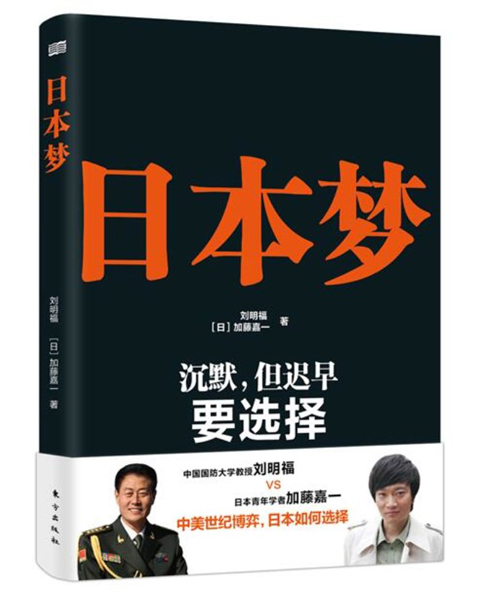Book debates Japan's choice between US, China
- By Zhang Lulu
 0 Comment(s)
0 Comment(s) Print
Print E-mail China.org.cn, March 23, 2017
E-mail China.org.cn, March 23, 2017
|
|
|
"The Japanese Dream" is co-written by retired Chinese colonel Liu Mingfu and Japanese scholar Yoshikazu Kato. |
A retired Chinese colonel and a young Japanese scholar recently co-wrote a book named "The Japanese Dream," in which the two - despite standing at different ends of the spectrum - debate Japan’s aspirations going forward and its choice between China and the United States.
Colonel Liu Mingfu and Yoshikazu Kato attended a book launch event in Beijing on Wednesday, held by Chinese think tank, Charhar Institute, where Kato is a researcher.
The book, written in a question and answer format between the two, revolves around a central theme of Japan’s standing between China and the United States, as exemplified by the words on the dust jacket "how Japan chooses in the centennial game between China and United States."
Col. Liu, often seen as a hard-line military officer, argues in the book that Japan is faced with a "strategic choice" right now, that is, it has to choose between its neighbor, the rapidly rising China, and its ally the United States. "In the 21st century, as China rises and the race between the Chinese dream and the American dream comes to the finals, Japan’s future is not only dependent on its relations with the United States but also its relations with China. It depends on the strategic choice between the great powers of China and the U.S."
He further said on Wednesday’s event that the world is now witnessing an "exit" trend started by the Brexit, and sooner the next step would be what he called the "Amerexit," namely, countries around the world will seek distance from American control and influence. He said that the Philippines has now divorced from the United States, the next one would be Japan.
But Kato, who studied in China for several years, believed there won’t be any fundamental changes to the alliance between Japan and the United State for the next ten to twenty years to come. He cited China’s rise in recent years as one reason that policymakers in Japan are increasingly cautious about China. "Seeing China’s rise, Japanese people, as a close neighbor, may have the most complicated state of mind," Kato writes in the book, adding that Japanese policy-makers fear China’s rising prowess may pose a threat to Japan, which in ancient times was under China’s tributary system.
Liu, in response, reassured that China’s rise would be a peaceful one. "After its great revival, China will build an unprecedented new type of regional and international relations, one that features non-alliance, non-conflict, peace, cooperation, equality and democracy." He added that unlike the ancient tributary system, the new East Asia system will be an open one in which countries in the region will be equal and follow the principles of equality and cooperation.
Kato said the nature of China’s rise needs to be watched going forward, but he acknowledged that Japan needs to enhance its cooperation with China. "Japan needs to prove by concrete actions that the Japan-U.S. alliance is in no conflict with enhancing the cooperation with China, otherwise it will be a dead end." He added that Japan can play a "coordinating or appeasing role" on issues like the South China Sea, North Korea’s nuclear issue and Taiwan.
"Going forward, Japan needs to learn to take advantage of powerful countries, especially the conflicts among powerful countries. Japan can benefit from it, and as well as reconcile the conflicts." he writes in the book.
The book is written in Chinese and published by People’s Oriental Publishing & Media Co. Ltd.







Go to Forum >>0 Comment(s)